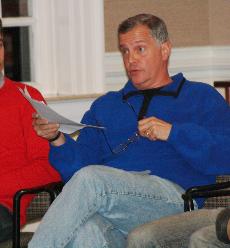Students, faculty, and administrators squeezed in shoulder-to-shoulder on couches, chairs, and floor space, as they filled Boren Lounge last Wednesday, for a special edition of Community Senate featuring much chalked- and talked-about Vice President for Enrollment Services Randy Doss. The attendees huddled close, yet could not have been more diverse in their differing concerns and opinions of the admissions process and athletics, which the meeting specifically addressed.
“I once read a book that said if you don’t have friction on a Quaker campus, then you don’t have a very good Quaker campus,” said Doss. “If you’re not talking about tough things in an educational environment, i don’t think you’re doing what you should be doing. I thought we talked about tough things on Wednesday night and that’s good. It was a dialogue – an exchange of thoughts, ideas, and concerns.”
Junior Grady Gamble, president of Blacks Unifying Society (B.U.S.), who attended the meeting, said, “The meeting allowed us to touch base on some issues, but it didn’t allow us to go into much depth. It was a chance to express all these things that students have been talking about openly to his (Doss’) face in a productive manner.”
Doss answered a set of questions devised by Senate, featuring questions, such as “how are the Quaker testimonies and values
marketed,” “where and to whom are we marketing ourselves?” “how does admissions view the athlete/non-athlete divide?” and more.
According to Doss, Guilford is not “marketed” by the traditional admissions office and there have been no changes in admissions processes within the past year.
“The way we find students intentionally is by buying names based off geography, majors, GPA, SAT/ACT scores, etc,” said Doss. “We don’t market. We recruit. There wasn’t a concerted effort to do X, Y, or Z. We know we are 80 percent tuition-driven, so we have to have the enrollment to fund a variety of majors and full time faculty.”
Though the admissions department says their processes have not changed, students inquired over the noticeable changes in demographics, such as the rising number of in-state students and athletes, as well as the small population of black non-athletes.
Throughout the meeting, community members inquired about the role of tour-guides, volunteers and coaches portraying and advertising Guilford.
“We hope well. We advertise for tour guides, and we train them,” said Doss. “When you have human beings giving tours, you try to train them the best you can and hope they’ll use good judgement.”
“Tours are given by our tour guides that have gone through training,” said senior Morgan Howard, former student tour-guide coordinator. “They have a manual. They shadow tour guides. They go on mock tours, and we set them free. What they say on those tours is completely up to them. Part of the training that Elizabeth and Randy give is to never lie on a tour and to tell the truth about how you feel. The tour-guide program is basically student-run.”
The specialty tours, which are given to large groups of people, frequently football players, sparked back and forth discussion in the meeting.
“I feel like we’re making allowances, why can’t they (the football players) come on a Saturday at 11 o’ clock with everybody else?” said senior tour guide, Paige McCall, during the meeting. “I’ve done the football tours and I try to say the same thing that I do on every other tour, but it’s hard when there are 70 big beefy football player guys that don’t care what a five-foot little white girl has to say about Guilford College and they want to see the press box.”
Howard explained that bigger, specialty tours, such as football tours, occur on days other than Saturday merely because of the large size of the tours and the amount of tour-guides that would be needed for a busy Saturday morning.
“Your insinuation is that they are not getting the same message, and that’s what we have to make sure of – that they get the same message,” said Doss.
Sophomore Jamie Sisk said, “I was recruited for football and got a totally different tour and definition of the college. The coaches made jokes about hippie and Quaker kids.”
“That’s terrible,” replied Doss.
While Doss explained that there are no admissions quotas for athletes, as admissions rose in 2009, the number of football recruits nearly doubled. However, Doss said that we need this number of football players to maintain enrollment and that numbers fluctuate from year to year, depending on virtually “all outside forces.”
“In the nearly two years that I have sat on the college’s enrollment committee I have learned a lot about the numbers,” said junior Hannah Kennedy, the Community Senate secretary. “The enrollment process has little room for indiscretion. I think that there are some students with the misconception that enrollment is much more finite and subjective than it is.”
The rising enrollment of athletes and the controversy over the intentional recruitment of a specific population, such as the inter-collegiate sports players, sparked a renewed interest and concern in the student athlete and non-athlete divide.
Doss asked students several times to help him better understand the fixation on the athlete/non-athlete divide.
“What’s the fascination with athletes all about?” said Doss. “Perhaps you can help me with this obsession.”
“I’m insanely uncomfortable with you using the word ‘obsession’ when I think we’re just being observant to the fact that our student population has changed,” responded sophomore Rachael Travis. “Maybe the overall numbers haven’t, but you said yourself that there has been an increase in football players. I’ve got no problem with football players, but that’s a drastic change.”

